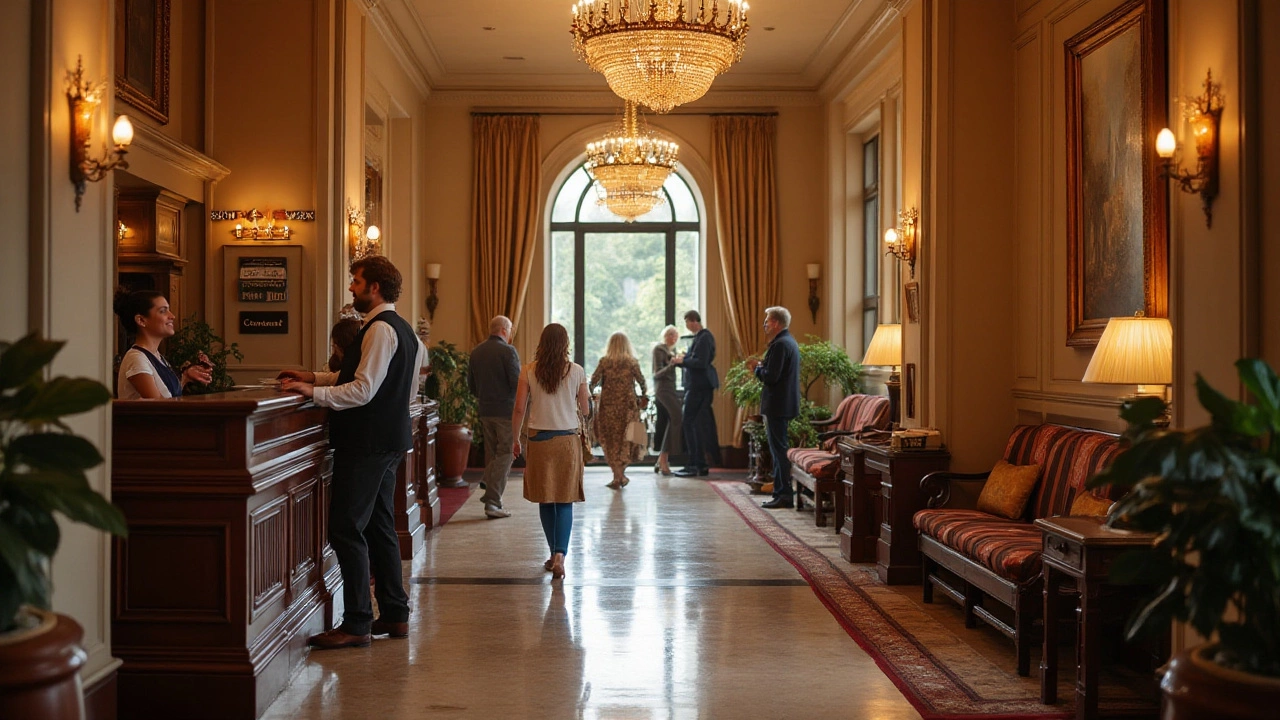Ah, the allure of an all-inclusive resort—the promise of a paradise where you can cast aside your worries, bask in the sun, and indulge at leisure. But amid the buffet spreads and poolside cocktails, a question lingers for many: Is it okay to never tip?
In these havens of hospitality, the customs of gratuity seem shrouded in ambiguity. Are those working tirelessly behind the serene façade relying on these extra tokens of appreciation? Or is it truly all included, as the deal suggests?
As we navigate this topic, we'll explore the dynamics between the all-inclusive promise and the human element of service. Whether you are a frugal traveler or a generous giver, understanding the nuances of tipping etiquette can enhance your journey. Let’s dive into what it means to tip—or not tip—on your next all-inclusive getaway and how this choice impacts both guests and the diligent staff making your vacation memorable.
- The All-Inclusive Experience
- Cultural Considerations
- Staff Perspectives on Gratuities
- Practical Tips for Tipping
- Ultimately, Who Benefits?
The All-Inclusive Experience
When you book an all-inclusive resort, you're not just reserving a room; you're diving into a world where carefree living is the central ethos. The concept behind these vacations is simplicity—everything from meals to drinks to activities is wrapped up in one upfront cost. This model promises convenience and a hassle-free escape from daily life. But as delightful as it sounds, this package deal brings along quirks, especially regarding tipping etiquette. Many guests find themselves pondering: when everything is seemingly paid for, is there a need to tip? The allure of all-inclusiveness suggests a world where money doesn't physically change hands after the initial payment. The catch is, this idea sometimes obscures the reality of the human effort underpinning the experience. As patrons lounge by the pool or dine in seaside restaurants, they may overlook the army of staff working diligently behind the scenes.
These resorts have become a beacon for travelers seeking to maximize their leisure time without worrying over minor expenditures. In reality, most all-inclusive packages do not explicitly include tips. While some resorts have policies stating that gratuities are covered by the package, others leave it to guests' discretion, causing confusion. This variance often leads to mixed behavior among visitors. For some, the idea of discretionary tipping parallels the comfort of ensuring exceptional service. For others, it is a ticket to freedom from constantly considering rewards for hotel service. The truth lies somewhere in between—neither expecting nor dismissing the need entirely. Indeed, a sense of gratitude often goes a long way.
One interesting insight from travel experiences is pinpointed in a survey conducted by the American Hotel and Lodging Association, revealing that nearly 85% of travelers prefer clarity regarding tipping expectations upfront. They feel more secure in knowing whether or not their generosity is truly contributing to the employees' livelihoods. The dynamic between service staff and tourists is shaped by these unwritten rules, which remain subject to individual interpretation. A well-placed tip can vastly enhance the quality of service received, cementing the notion that kindness, beyond policy, is appreciated. To quote renowned travel guru Rick Steves, "Travel is intensified living." Part of this intensity is finding a balance between proper protocol and heartfelt gestures.
Cultural Considerations
Tipping in the world of all-inclusive resorts is an art colored by cultural strokes that vary across destinations. Picture this: every culture carries its own tapestry of habits and expectations when it comes to gratitude in financial terms. In some countries, like the United States and Canada, leaving a tip for service staff is standard, almost second nature, as part of showing appreciation. It’s not just encouraged; it's expected. However, contrast that with a trip to Japan, where tipping might even be viewed as slightly offensive, as the service included is part of a professional duty, not a means to an end.
Now, when it comes to resorts scattered across the Caribbean or nestled in the Mexican coastlines, these practices may lean towards American customs due to the substantial influx of North American tourists. Here, tipping isn’t just accepted; it’s warmly received. But remember, not every paradise shares the same story. Some places weave the art of tipping into their culture tightly, while others keep it at arm's length as an unnecessary addition. A seasoned traveler once noted, "In the joyous arms of generosity lies a beacon of cultural understanding," hinting at the nuanced dance of tipping across various travels.
The expectation to leave gratuities often tags along with the whispery tales of European spots, like Italy or France. Even though many bills already include a service charge, offering a bit more is still a kind gesture that isn’t looked down upon. It can be puzzling for visitors to get the hang of it when each place has its unwritten decorum. The key is to research and respect the local customs as a means to navigate this tipping maze. A stroll through travel forums can also offer a peek into the unspoken rules that dictate when, where, and how much to give. And remember, while monetary tips feel like the way to go, sometimes nothing beats the heartfelt compliment that lingers longer than any currency ever could.
A journey through these destinations becomes more insightful with a look at specific statistics which illustrate how diverse these practices can be. Here's a simple depiction displaying average tipping practices in popular resort destinations:
| Destination | Tipping Rate |
|---|---|
| USA | 15-20% |
| Mexico | 10-15% |
| Jamaica | 10% |
| Japan | 0% (Not customary) |
While numbers can guide, the experiences shared are even richer, laden with cultural nuances that figures alone can’t quite capture. So, when you pack those bags, include a dash of these cultural insights — they cost nothing in excess baggage fees but are worth the weight in wisdom.

Staff Perspectives on Gratuities
At the heart of every all-inclusive resort lies a dedicated team of individuals working to ensure guests enjoy a seamless and memorable experience. For many of them, gratuities serve as a significant supplement to their income. While the resort package might suggest that all costs are covered, the reality for service staff can be quite different. These individuals often rely on tips to bridge the gap between their base salary and a living wage, a dynamic that can make tipping a more important aspect of the vacation experience for both staff and guests alike.
Tipping etiquette varies greatly depending on the location of the resort. In some countries, it's considered customary to express gratitude through tipping, even at all-inclusives. For example, in Mexico and the Caribbean, where many such resorts are located, tipping remains a widespread practice. These contributions not only reward personal service but also help to support the local economy by ensuring that tourism dollars stay in the communities. Often, even a small tip can make a considerable difference in the lives of hospitality workers whose hourly wages might be modest by comparison to those in other countries.
Testimonials from resort employees illuminate just how much these gestures mean to them. One bartender at a popular Caribbean resort shared, "The smiles and tips we receive from guests are what keep us motivated to go above and beyond. It's not just about the money, but the recognition of our efforts." This sentiment echoes throughout the service industry, where acknowledgment in the form of a tip can validate a job well done, turning a moment of service into a memorable interaction for both parties involved.
A study conducted by the University of Nevada's Hospitality Department highlighted how gratuities impact job satisfaction among resort workers. According to their research, employees who regularly received tips reported higher levels of satisfaction and engagement in their roles. The study also found that tipping could enhance the overall quality of service provided, as motivated staff were more likely to exceed guest expectations, leading to increased customer satisfaction and loyalty.
While guests at all-inclusive resorts aren't obligated to tip, understanding the perspectives of the staff can lead to more informed choices. By acknowledging the dedication of those who make vacation dreams come true, travelers can ensure their gratitude contributes positively to the very foundation of their vacation experience.Given these insights, it seems that tipping, where financially feasible, offers kindness that goes far beyond monetary value. It fosters a connection, creating a sense of mutual respect and appreciation between tourists and the people they encounter during their travels.
Practical Tips for Tipping
When navigating the world of all-inclusive resorts, understanding the nuances of tipping can make a significant difference in both your experience and that of the staff. Each destination and resort has its own set of unwritten rules, so it's paramount to do a little homework before you go. First, start by researching your specific resort's tipping policy. Some places include tips in the form of a service charge, while others hint subtly that gratuities are appreciated. By aligning with the resort's expectations, you can avoid any awkward moments and make sure that your gesture of appreciation is well-received.
Moreover, consider the cultural norms of the country you are visiting as these can influence the tipping etiquette. Take Mexico for example, where tipping is generally expected even in an all-inclusive setting, while in certain parts of Europe, gratuities can be seen as less obligatory. It's always beneficial to ask the locals or consult travel forums to ensure you're respecting local customs and not unintentionally offending anyone. Learning a bit about the place you're visiting shows respect and can even enhance your adventure.
It’s also worth noting which staff members commonly receive tips. While it might seem obvious to tip the bartenders and waitstaff, don't overlook the housekeeping staff, who work just as hard to ensure your room remains a relaxing haven, or the porters who manage your luggage with care. A small gesture of thanks to these often-overlooked staff can mean a great deal, as their work directly contributes to the seamless nature of your stay. Consider setting aside smaller bills in the local currency for this purpose.
"For guests staying at all-inclusive resorts, it's important to remember that a small tip can go a long way in enhancing your experience. The smile of an appreciative broom-holder will often light up your day more than you imagine," advises veteran travel consultant Alexandra Becker.
Another practical tip? Carrying small denominations can be a lifesaver. Imagine reaching for a five, but only having twenties—awkward, right? Stocking up on smaller bills in advance saves you from this potential hiccup and makes spontaneous tipping much easier. If you're strapped for cash, some resorts allow tipping through your room bill at checkout, which can be a convenient alternative for the more forgetful among us. Remember, even in a cashless world, a physical gesture can leave a stronger impression.
Lastly, bear in mind that tipping is a personal decision. You should never feel compelled beyond your means or guilty if it isn’t within your budget. A smile and a heartfelt thank you can go a long way, too. What matters most is the genuine appreciation behind the gesture, whether it's expressed through currency or courtesy. Your approach to tipping can be an organic extension of the experience itself, echoing with the warmth and gratitude of the getaway you’ve enjoyed.

Ultimately, Who Benefits?
In the bustling world of all-inclusive resorts, the question of who truly benefits from the tipping practice is one that demands a closer inspection. On the surface, the absence of a tipping requirement might appear as a blessing to vacationers, allowing them to enjoy their holiday without reaching for their wallets at every turn. Yet, beneath these well-trodden paths lies a network of staff whose livelihoods often depend heavily on the gratuities they receive. While the excitement of an all-inclusive experience offers convenience and luxury, it's vital to consider the ripple effects on hotel employees. Many work diligently, driven by the hope of earning tips as a supplement to their base wages, which can be minimal in industries centered around hospitality.
From waiters ensuring your glasses brim with tropical drinks to housekeepers weaving impeccable cleanliness into every corner of your suite, their roles are undeniably central to a memorable stay. The financial rewards they receive through tips can significantly enhance their income, often making the difference between a sustainable living and mere survival. According to a survey conducted by the American Hotel & Lodging Association, staff at resorts dependent on tourism may earn up to 30% more in gratuity-based income compared to their base salary alone. This indicates a substantial dependence on tips, shaping an economic balance where tipping extends beyond a mere gesture of appreciation.
The Larger Picture
But tipping does not only benefit individuals; there is a considerable psychological and service quality aspect rooted in this practice. Gratitude expressed through financial reward often leads to heightened staff morale, fostering an environment where service quality is enhanced. Guests who partake in tipping might notice a personalized attention they receive, creating a positive feedback loop where staff strive to go above and beyond, further enhancing the luxury experience promised by all-inclusive resorts. This mutually beneficial relationship not only enhances vacationers' experiences but also contributes to a more dynamic and motivated workforce.
It's essential, however, to navigate tipping customs with cultural sensitivity, particularly in destinations where local standards may differ. Being mindful of regional expectations and consulting with resort staff or travel experts can provide clarity. A quote from Zig Ziglar, a notable motivational speaker, succinctly captures this dynamic:
"You never know when a moment and a few sincere words can have an impact on a life forever."Here, tipping can be likened to those "few sincere words," holding the potential to make a transformative impact on the lives of hotel workers.
Ultimately, while tipping remains a personal choice, its absence may inadvertently alter the delicate ecosystem within which these resorts operate. Hence, if your budget allows, considering discretionary tips might be an invaluable enhancement not only to your vacation experience but also to the wellbeing of those tirelessly shaping your journey with moments of joy and relaxation.

